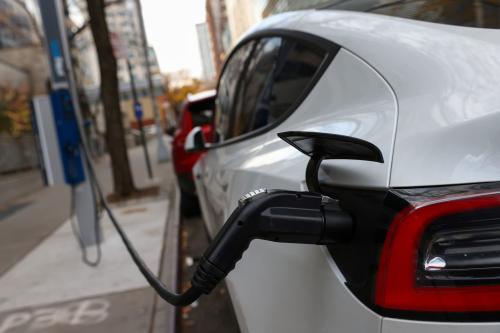Electric vehicles (EVs)—notwithstanding the high-end success story of Tesla Motors—remain stuck in a classic “chicken and egg” dilemma. Achieving widespread market penetration requires ubiquitous charging stations. But charging station scale-up requires a critical mass of EVs already on the road to justify the investment.
One approach to this problem is what a variety of partners in the state of Tennessee are doing through a $230 million public-private partnership partly funded by a grant from the Department of Energy (DOE) and managed by ECOtality. Together, these actors—working as a charter market for Ecotality’s EV Project, the largest deployment of EVs and charging infrastructure to date—are forcing the issue and simply blowing through the market challenge by building a ton of charging stations fast.
Tennessee’s involvement in the project is remarkable for a number of reasons. For one thing, the Tennessee effort is seeking to get to scale fast and so covers a larger geographical area than any other EV Project site. Knoxville, Chattanooga, Nashville, Memphis, and other smaller towns in east, west, and middle Tennessee are all gaining charging sites. In fact, DOE data reveal that there are 294 public EV charging stations in Tennessee catering to cars such as the Nissan Leaf, Chevrolet Volt, and Ford Focus Electric. Tennessee businesses including Cracker Barrel, Sears, and Crowne Plaza now host EV Project charging stations. Even more impressive are moves to essentially cover the full expanse of the state at highway scale. Most notable is the new coverage of the 425-mile stretch of highway that connects Knoxville, Nashville, and Chattanooga in what is known as the Tennessee Triangle. That is actually the nation’s largest EV charging corridor connecting multiple metropolitan areas.
Additionally, Tennessee’s EV project is also noteworthy for the strong support it has received from a variety of partners including state and local government, regional utility partners, the Tennessee Valley Authority (TVA), Oak Ridge National Laboratory (ORNL), and Nissan North America. Tennessee committed $2.5 million early on in the project to give as rebates to people purchasing the Leaf and Volt models. TVA, in partnership with ORNL and the Electric Power Research Institute, has developed solar assisted EV charging stations—also called the Smart Modal Area Recharge Terminal (SMART)—to minimize demand on the grid and integrate the use of renewable energy sources. The SMART station is being deployed in conjunction with the EV Project and 125 charging stations have been installed in the Knoxville-Nashville-Chattanooga corridor.
With so much going on Tennessee is well on its way to becoming an important test bed for advancing the deployment of EVs in the United States. As one of only a few states participating in the EV Project, Tennessee is contributing valuable data on infrastructure deployment process (for instance, how to select public charging locations that will provide maximum benefit to vehicle owners and charging hosts), charging station performance, vehicle owner driving and charging behavior, and impact on electric grid. All vehicles and charging units are equipped with meters and data loggers and the information is transmitted to a central database managed by ECOtality and the Idaho National Laboratory. In this fashion, the state’s efforts may yield critical insights on how to obliterate the chicken-egg conundrum and accelerate the deployment of EVs across the nation in the next few years.



Commentary
Building an Electric Vehicle Highway to Energy Security: Tennessee EV Project
June 12, 2013